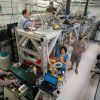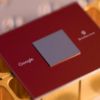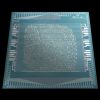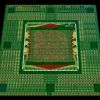-
 +22 +3
+22 +3How a simple ‘hello’ became the first message sent via the Internet
No fanfare. No cleverly contrived quote for the history books. And yet, at 10:30 p.m. on Wednesday, Oct. 29, 1969, three months after Neil Armstrong’s famous step, came another giant leap for mankind. Just months after the first manned moon landing, the ARPANET, granddaddy to the World Wide Web, was brought to life with a rather inauspicious first communication: the letters “L” and “O.” UCLA grad student Charley Kline had been trying to type “LOGIN,”
-
 +23 +4
+23 +4Quantum computing’s ‘Hello World’ moment
Does quantum computing really exist? It’s fitting that for decades this field has been haunted by the fundamental uncertainty of whether it would, eventually, prove to be a wild goose chase. But Google has collapsed this nagging superposition with research not just demonstrating what’s called “quantum supremacy,” but more importantly showing that this also is only the very beginning of what quantum computers will eventually be capable of.
-
 +23 +3
+23 +3Google: We've made 'quantum supremacy' breakthrough with 54-qubit Sycamore chip
Google researchers today published their latest work on quantum computing in Nature, showing off how its new Sycamore processor can run a test computation in 200 seconds that would take the world's biggest supercomputers 10,000 years to complete.
-
 +22 +4
+22 +4IBM Says Google’s Quantum Leap Was a Quantum Flop
A paper from Google leaked last month claimed its researchers had achieved “quantum supremacy.” Now IBM says Google rigged the test.
-
 +25 +6
+25 +6Moore's Law Is Dying. This Brain-Inspired Analogue Chip Is a Glimpse of What's Next
The quantum realm isn’t the only way to get past binary computation. Our own brains are also a source of inspiration to overhaul the computational world.
-
 +31 +13
+31 +13Why Google's Quantum Victory Is a Huge Deal—and a Letdown
When news leaked that Google scientists had achieved "quantum supremacy," researchers immediately clashed on its implications.
-
 +6 +1
+6 +1Google’s Quantum Computing Breakthrough Brings Blockchain Resistance Into the Spotlight Again
Quantum computing has been on the tech radar for some time now, but it has also been lurking in the background of the blockchain ecosystem for very different reasons. The new advancement of computing allows for complex equations and problems to be solved exponentially quicker than is currently available.
-
 +23 +3
+23 +3Numbers limit how accurately digital computers model chaos
The study, published today in Advanced Theory and Simulations, shows that digital computers cannot reliably reproduce the behaviour of 'chaotic systems' which are widespread. This fundamental limitation could have implications for high performance computation (HPC) and for applications of machine learning to HPC.
-
 +23 +5
+23 +5Google Claims 'Quantum Supremacy' with 53-Qubits
In a new scientific publication, Google claims to have reached “quantum supremacy” with a 53-qubit quantum computer, meaning that it has solved a problem that no classical computer can solve within a reasonable timeframe. It is the first time this has been achieved, marking a major milestone in the field of quantum computing.
-
 +33 +7
+33 +7Are brain implants the future of thinking?
Brain-computer interface technology is moving fast and Silicon Valley is moving in. Will we all soon be typing with our minds?
-
 +25 +4
+25 +4The Mac Portable—an Apple flop that led to great things—turns 30
On September 20, 1989, Apple product chief Jean-Louis Gassée stood on a stage in Universal City, California, and unveiled a new computer, the Macintosh Portable. It was Apple’s first battery-powered Mac, and the goal, Gassée declared, was to build a portable Mac that was every bit as powerful and usable as the familiar desktop models: “No subset of applications, no Mac Jr., no compromise.”
-
 +19 +2
+19 +2Google Says It's Achieved Quantum Supremacy, a World-First: Report
A Google researcher’s paper claiming to have achieved quantum supremacy, a major early milestone in the field of quantum computing, appeared on a NASA website this week before being removed, the Financial Times reports.
-
 +13 +3
+13 +3IBM will soon launch a 53-qubit quantum computer
IBM continues to push its quantum computing efforts forward and today announced that it will soon make a 53-qubit quantum computer available to clients of its IBM Q Network. The new system, which is scheduled to go online in the middle of next month, will be the largest universal quantum computer available for external use yet.
-
 +14 +4
+14 +4Working in high performance computing? These are the stats you should know
For as long as there have been commercial computers, some hardware was designed for ultimate speed and data-crunching. Here are the numbers that show you how HPC makes a difference.
-
 +27 +6
+27 +6Eerie artificial intelligence matches faces to voices
Researchers at the Massachusetts Institute for Technology (MIT) have created an algorithm called Speech2Face which has been able to, simply based on listening to the sound of different human voices, create rough facsimiles of those human’s physical appearance. This research was presented on Arxiv, the electronic preprint database for scientific papers not yet sent for peer review, back in May and has already caused something of a stir.
-
 +17 +4
+17 +4Silicon Is Reaching its Limits. Up Next: Carbon Nanotubes
Silicon has powered the information age, but it’s reaching its physical limits. Carbon nanotubes (CNTs) hold a lot of promise as a replacement if we can get around some key obstacles—and the designers of a new chip seem to have done just that. For decades computer power steadily increased in line with Moore’s Law, which observed that the number of transistors in a chip doubled roughly every two years.
-
 +12 +3
+12 +3The world’s most advanced nanotube computer may keep Moore’s Law alive
MIT researchers have found new ways to cure headaches in manufacturing carbon nanotube processors, which are faster and less power hungry than silicon chips.
-
 +17 +6
+17 +6Unix at 50: How the OS that powered smartphones started from failure
Today, Unix powers iOS and Android—its legend begins with a gator and a trio of researchers.
-
 +21 +2
+21 +2A chip made with carbon nanotubes, not silicon, marks a computing milestone
Silicon’s reign in cutting-edge electronics may soon over. The carbon nanotube could be its successor.
-
 +22 +2
+22 +2This Superconductor Could Be Key to a Whole Different Type of Quantum Computer
For quantum computing to become fully realised, we're going to have to make a few huge scientific leaps along the way – including finding a superconductor that can act in the same way as silicon does in today's computing. A team of researchers thin
Submit a link
Start a discussion




















